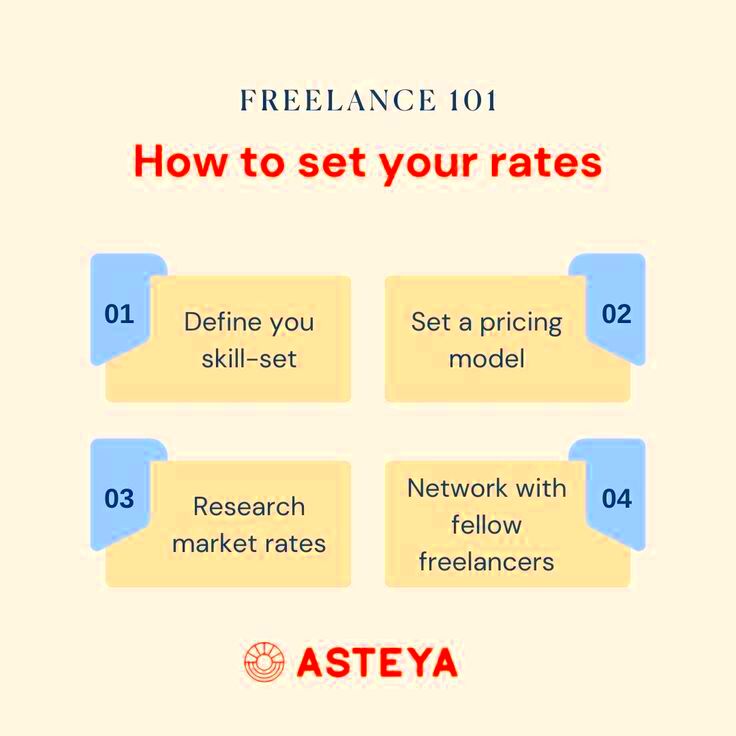As a freelancer, it’s critical to comprehend your worth. It isn’t merely about what you’re able to do; rather it is about the distinctive value that one offers their clientele. By knowing your worth, you are able to charge reasonably and develop confidence during negotiations pertaining to rates. In view of this, here are some considerations:
- Your Skills: Reflect on your expertise and the skills you possess. Are you a graphic designer, a writer, or a developer? Each skill set carries its own market value.
- Your Experience: The more experience you have, the more you can charge. Clients often look for freelancers who can deliver quality work based on proven results.
- Your Niche: Specializing in a particular niche can make you more valuable. Clients are often willing to pay more for specialized knowledge.
Factors Influencing Your Charges

There are several aspects to consider when you are outlining your prices. With this knowledge, you can be able to determine what a fair price for your services is. Here are some of them:
- Market Demand: If your skill set is in high demand, you can justify higher rates.
- Project Complexity: More complex projects require more time and expertise, which should be reflected in your pricing.
- Client Budget: Understanding what your clients can afford is important. This can guide you in setting flexible rates.
- Your Location: Depending on where you are located, your charges may vary. For instance, freelancers in larger cities may charge more than those in smaller towns.
Also Read This: Incorporating Freelance Experience on Your Resume
Researching Industry Standards

Related to your charges, this information is really important for you to know. Industry standard research offers helpful data. To collect such information, these strategies can be useful.
- Freelance Platforms: Websites like Fiverr, Upwork, and Freelancer can give you an idea of what freelancers with similar skills are charging.
- Professional Associations: Many industries have professional associations that publish salary surveys or charge guides.
- Networking: Connecting with other freelancers in your field can help you understand the going rates.
You might want to consider establishing a table for purposes of comparing various fees:
| Skill | Average Hourly Rate |
|---|---|
| Graphic Designer | $50 - $150 |
| Content Writer | $30 - $100 |
| Web Developer | $60 - $200 |
When you know the industry norms, you may set your prices with conviction and assure that they are in harmony with the requirements on the market.
Also Read This: Earnings of Freelance Web Designers
Calculating Your Expenses and Profit Margin

In order to identify appropriate expenses, you need to know how much money you’ve made and what your expenses are. This is a very important step because it will make sure that you’re not only recovering from costs but also gaining some cash. Here are the best ways for determining your expenses as well as coming up with decent profits:
- Identify Your Expenses: Start by listing all your monthly expenses related to freelancing. This could include:
- Software subscriptions
- Hardware costs (laptops, cameras, etc.)
- Office supplies
- Marketing expenses
- Internet and utility bills
- Calculate Your Total Monthly Expenses: Add up all these expenses to find your total monthly cost of doing business.
- Determine Your Desired Profit Margin: Decide how much profit you want to make on top of your expenses. A common profit margin for freelancers is between 20% to 50%.
- Set Your Rates: Use the following formula to calculate your hourly rate:
Hourly Rate = (Total Monthly Expenses + Desired Profit) / Billable Hours
This is a calculation that can make certain the rates are enough to cover costs and desired profits thus establishing a firm financial base.
Also Read This: How to Start as a Freelance Blog Writer
Choosing a Pricing Model That Fits

To achieve success as a freelancer selecting the appropriate pricing model is very important. Various models may be favorable for various services, clients and projects. The following are some examples of pricing models that are common in the industry:
- Hourly Rate: Charging per hour is straightforward and common for many freelancers. It allows you to be compensated for every hour worked.
- Fixed Price: For projects with clearly defined scopes, fixed pricing can be beneficial. It gives clients certainty about costs and can reward efficiency.
- Retainer Model: This model is great for ongoing work. Clients pay a set fee each month for a specific number of hours or services.
- Value-Based Pricing: Charge based on the value you provide to the client rather than just the time spent. This can often yield higher earnings.
When selecting a model, keep in mind your services and customers. In certain cases, blending these tactics may offer optimal solutions to your enterprise.
Also Read This: A Guide to Being a Successful Freelance Artist
Adjusting Your Rates Over Time
As one progresses along the learning curve, they should consider whether or not their rate schedule is adequately keeping pace with improved expertise and knowledge. Below are some reasons and tips for adjusting rates over time:
- Increased Experience: As you complete more projects and gain expertise, your value in the market increases. Adjust your rates to reflect this growth.
- Inflation and Cost of Living: As living costs rise, your rates should adjust to maintain your profit margin.
- Changing Market Demand: If there’s a surge in demand for your services, it may be the right time to increase your rates.
Here is a simple technique for increasing your prices:
- Notify clients in advance, giving them a timeline for the new rates.
- Justify your increase by highlighting your achievements, skills, and added value.
- Consider a phased approach, where you gradually increase rates for existing clients while setting higher rates for new clients.
The evaluation of charges on a constantly done basis ensures the continued profitability and sustainability of freelancing activity.
Also Read This: How to Make a Good Profile on Fiverr
Communicating Your Rates to Clients
Freelancing rates can be very hard to discuss with clients as a freelancer. The most important thing in any communication is to ensure that you are understood by your client. The following are tips for communicating your rates clearly:
- Be Transparent: Clearly outline your rates and any additional costs. This helps avoid misunderstandings later on.
- Provide Context: Explain why you charge what you do. Share your experience, skills, and the value you bring to the project. This builds trust and justifies your pricing.
- Use Written Proposals: Whenever possible, present your rates in a written proposal. This allows clients to review the information at their leisure and helps solidify your professionalism.
- Be Open to Discussion: While you should stand firm on your rates, be willing to listen to client concerns. They may have budget constraints, and a little flexibility could lead to a long-term relationship.
Ultimately, you should be sure of your value. Keep in mind that setting reasonable prices according to what you can offer is not only a matter of doing business but also represents one's professionalism.
Also Read This: How to Create a Fiverr Writing Account
Frequently Asked Questions
Here are some of the questions clients often ask regarding rates and pricing:
- How do I know if my rates are competitive?
Research your industry and compare rates on freelance platforms to gauge where you stand. - What if a client says my rates are too high?
Listen to their concerns and be prepared to explain the value you offer. You might also suggest adjusting the scope of work to meet their budget. - Should I charge for revisions?
It depends on your pricing model. If you offer unlimited revisions, make sure this is reflected in your rates. - When should I raise my rates?
Regularly review your rates. Consider raising them after completing a significant project or gaining additional skills.
Conclusion
One fundamental component of crafting a sustainable business is establishing and conveying one’s charges as a freelancer. Solidifying the base for freelancing requires that you comprehend your import, estimate your outlays and elect the right pricing structure. Bear in mind that proper communication pertaining to your rates develops trust and transparency between yourself and clients thus facilitating the development of long-lasting associations.
As well as this, by regularly reviewing and adjusting your rates, you will be with competition while showing the progress you have made in your career and its value to customers. The key to succeed in freelancing is remembering these principles!




